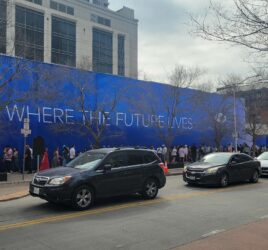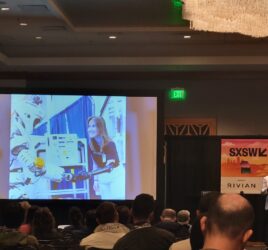On The Future of Technology, Remix Culture and Software Tools (68 of 90)
<1>
Last week, I gave a presentation at the Popular Culture Association that didn’t go very well.
It was the first public presentation of a project that Brian McNely, Matt Mullins and I had worked on for the better part of this school year. The goal of “The Object Remix”: create a story using publicly available footage done people on YouTube, develop a framework for both teaching this remix writing and a technological understanding of what needs to happen to make this more mainstream and examine the impact of public/private lives.
On the whole, the presentation was okay, a learning experience for the three of us. We’re getting a sense of how to tell the story of the story we created. That takes time.
What didn’t go well was the ambush on my particular section (which I won’t go into). But ruminating on my discussions with those in attendance about what happened has helped me clarify a valuable component to my presentation.
My main thesis, building off Larry Lessig’s work (in particular Remix and Code), is this:
- that technology companies have taken vague notions of law (e.g. copyright) and make it concrete (e.g. Digital Rights Management), which eliminates not only the ability to use certain “available” media (e.g. Creative Commons work uploaded to YouTube without the ability to download) but also the notion that there is a difference between “free” culture and “controlled” culture; and
- the Internet (and other networks) allow us to get anything we want, which means an arbitrary notion of control will not only fail but also – as I mentioned – created a disregard for those concrete notions that fly in the face of what we are actually doing; so
- we must develop software tools – in the vein of Vannevar Bush, JCR Licklider, Robert Taylor, ect – that allow us to parse through all media and find, easily, the “free” culture; otherwise
- we have pushed all use of work into the realm of piracy, devaluing what it is that is being done anyway.
My goal then, in this project, to is build a framework for building software tools that enable Remix culture within a copyright controlled world (or any mixed system of given rights, such as the Creative Commons, or affirmative rights, such as Copyright law).
<2>
That’s a whole lot of Academic-ese to say this: we’ve got to make finding materials that can be legally used by amateur culture much easier than it is today and then integrate those tools into academic disciplines that teach students how to work within the current culture.
If we can’t do that, we’ve done little more than build a cottage industry around writings about Participatory Culture and Remix Culture. We’ve turned academic what is already in practice.
The solution is easy. And it is hard.
Fortunately, people like Lessig have already created a framework for allowing amateur culture to freely share – with various controls – media being created. The Creative Commons allows for such works to be centralized and distributed.
In that sense, the idea for this framework has already been created. We could – as educators – simply send our students into this realm for all of our projects. Teaching students to take control over their work, making decisions about what can be done with it (instead of allowing it to be automatically Copyrighted at first publication).
This is an amazing first step, one that makes all other steps possible. But there needs to be more.
<3>
Lessig’s argument in Code is, if I can boil a book into one sentence, that programming determines what we can – and more importantly, what we can’t – do on a digital network.
The tools made available to the general, non-programming public have a profound effect not only on what we create, but also on what we don’t know what we can do. The classic example: Apple’s iTunes store solves the “centralized” problem I discussed in <2>, creating a searchable location where music can be legally purchased. That seems great.
However.
That system, which comes with the kinds of DRM I discussed in <1> 1., removes the ability for a consumer to sell that digital copy (First-sale doctrine), a right that exists outside the digital realm.
In other words, a technology removes a right that you have without – in all likelihood – you understanding that right has been removed.
How the Internet’s programming (a term that will surely draw ire, properly, from my technologist brethren) works determines not only what you can and can’t do, but what the general public and casual user will even understand to be possible.
Innovation, then, lies in the hands of companies. Companies that benefit from removing the barrier to creating competitive products.
<4>
Taken together, these 3 parts, we come to the Really Ultimate Goal of the my section of the project. One that has become clear in the last few days:
- understand the kinds of software tools and systems that need to be build to enable companies (e.g. YouTube, Flickr, ect) to deploy a “Remix” search for content that can be used by the amateur culture;
- build a theoretical framework for what that looks like; and
- create a educational project around that idea to demonstrate what this would look like
What I don’t want to do is write about this, not in the way I’m approaching The Cult of Me. The world doesn’t need another manifesto on this. Lessig and Henry Jenkins have written what needs to be written on the subject.
What we need now is are tools that can parse through the data stream, return alternatives to Copyrighted Works and enable the legal spread of this culture.
Because that spread, I believe, will undermine the current Copyright system, exposing the flaws within it that need to be reigned in, updated and removed entirely from corporate control. This, unfortunately, won’t happen through government intervention.
It will happen – as with much in the technological realm – by creating a competitive product.



